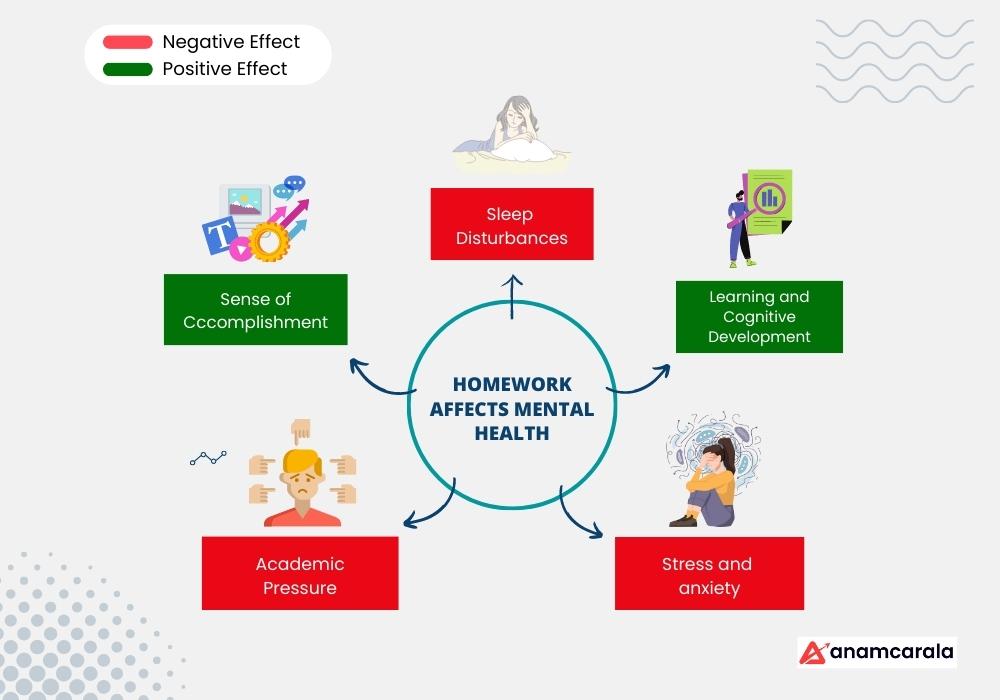Homework has been an integral part of education for centuries. Serving as a tool to reinforce classroom learning and develop critical skills. However, in recent times, homework affect mental health or impacts students’ mental health. As an educator, parent, or student, you may have wondered whether the burden of homework negatively affects a young mind’s well-being.
In this blog, we will explore the relationship between homework and mental health. Examining both the potential pitfalls and the positive aspects. We will also discuss strategies to strike a balance that promotes academic growth while safeguarding students’ mental and emotional well-being.
The Link Between Homework and Mental Health
Research on the connection between homework and mental health has yielded mixed results. While some studies suggest a correlation between excessive homework and increased stress, anxiety, and sleep disturbances. Others argue that homework can foster responsibility, time management, and perseverance, which are essential life skills. The key lies in understanding the balance and moderation needed to avoid adverse effects.
Understanding Homework and Its Purpose
Homework refers to academic tasks and assignments given to students by their teachers to be completed outside of regular class time. The purpose of homework varies depending on educational systems, grade levels, and subject areas. But its main objectives are generally consistent:
Reinforcement And Practice: Homework allows students to practice the concepts and skills they learned in class. It reinforces their understanding and helps them apply what they have learned independently. Deepening their knowledge and retention of the material.
Extension Of Learning: Homework can extend the learning experience beyond the classroom. It encourages students to explore additional resources, conduct research, or engage in hands-on activities related to the topics covered in class.
Time Management And Responsibility: Completing homework requires students to manage their time effectively and take responsibility for their learning. Meeting deadlines and organizing their work helps develop crucial life skills.
Preparation For Class: Sometimes, homework serves as a preparation for upcoming lessons. It might involve reading a chapter or researching a topic in advance, ensuring students are ready to engage in meaningful discussions during class.
Assessment And Evaluation: Homework can serve as a form of assessment, providing teachers with insights into individual student progress and identifying areas that require further attention or support.
Independent Learning: By working on assignments outside the classroom, students are encouraged to be independent learners, fostering critical thinking and problem-solving skills.
Parental Involvement in homework affect mental health
Homework can involve parents or guardians in the learning process, fostering communication between school and home. Parents can help students with homework, monitor progress, and provide support as needed.
While homework offers many benefits, there is ongoing debate about its effectiveness and the appropriate amount of homework to assign. Excessive amounts of homework can lead to stress, reduced family time, and less opportunity for students to pursue extracurricular activities.
Effective homework should be purposeful, relevant, and tailored to the student’s age, ability, and developmental stage. It should also align with the overall educational goals and curriculum of the school or educational institution. Additionally, feedback from teachers on completed homework can further enhance its educational value, providing students with insights into their performance and understanding of the material.
How does homework affect mental health?

Homework can have both positive and negative effects on mental health, depending on various factors such as the amount of homework, individual coping mechanisms, and support systems. Here are some ways in which homework can affect mental health:
Positive Effects
- Sense of accomplishment: Completing homework assignments can provide a sense of achievement and boost self-esteem, positively impacting mental well-being.
- Time management skills: Homework can help students develop time management skills, which are valuable in handling stress and meeting deadlines throughout life.
- Learning and cognitive development: Engaging with homework tasks reinforces the learning process, which can lead to increased cognitive abilities and confidence in academic skills.
Negative Effects
- Stress and anxiety: Excessive or challenging homework can lead to heightened stress and anxiety levels, especially when coupled with other academic and extracurricular pressures.
- Lack of balance: Heavy homework loads may reduce the time for relaxation, hobbies, and socializing, affecting overall mental and emotional well-being.
- Sleep disturbances: Prolonged homework sessions, especially when done late at night, can disrupt sleep patterns, leading to fatigue and decreased focus.
- Perfectionism: Homework can trigger perfectionistic tendencies, leading to excessive worry about grades and performance, which can negatively impact mental health.
- Academic pressure: Constant focus on homework and academic performance can lead to burnout and a fear of failure, contributing to stress and anxiety.
- Family dynamics: Excessive homework can strain family relationships, causing conflicts and added pressure on both students and parents.
Striking a Balance
Finding a balance in assigning homework is crucial to ensure it benefits students without causing excessive stress. Teachers and educational institutions should consider the following strategies:
- Reasonable Workload: Assigning a reasonable amount of homework that aligns with educational goals and doesn’t overload students is essential.
- Differentiated Assignments: Tailoring homework to meet student’s individual needs and abilities can help prevent feelings of inadequacy or boredom.
- Support Systems: Offering academic support and resources to help students with their homework can reduce stress and anxiety.
- Focus on Quality: Encouraging meaningful and engaging homework assignments can motivate students and make the learning process more enjoyable.
- Encourage Balance: Educators and parents should encourage a balanced lifestyle, ensuring that students have time for extracurricular activities, relaxation, and social interactions.
- Open Communication: Creating an environment where students feel comfortable discussing their concerns about homework can help address potential issues before they escalate.
Ultimately, it’s essential to consider the well-being of students when assigning homework and to recognize that their mental health and overall development should be a top priority in the education system.
What are the homework assignments in mental health?
Homework assignments in mental health are tasks or exercises given by mental health professionals to their clients as part of therapy or treatment. These assignments aim to complement in-person sessions and promote ongoing progress and self-reflection. They can vary widely based on the individual’s specific needs and the therapeutic approach used by the mental health practitioner.
Some common homework assignments may include keeping a mood or thought journal to track emotions and thought patterns, practicing relaxation techniques like deep breathing or meditation, setting and working towards achievable goals, challenging negative thought patterns through cognitive restructuring exercises, engaging in social activities to combat isolation, and learning coping strategies to manage stress or anxiety. Homework assignments in mental health encourage clients to take an active role in their healing process, enhancing self-awareness, and empowering them with practical tools to navigate and improve their mental well-being.
There are several strategies to Decrease Homework-Related Stress

- Establish a Routine
- Organize and Prioritize
- Create a Productive Study Environment
- Encourage Physical Activity
- Practice Mindfulness and Relaxation Techniques
- Limit Technology Distractions
- Break Tasks into Smaller Chunks
- Encourage Adequate Sleep
- Promote Positive Self-Talk
- Supportive Environment
- Teach Time Management Skills
- Offer Homework Assistance
- Encourage Healthy Habits
- Model Healthy Stress Coping Mechanisms
Alternative Approaches to Homework
- Project-Based Learning: Assigning hands-on projects that encourage students to delve deep into a specific topic or subject, fostering critical thinking and creativity.
- Flipped Classroom: Students watch pre-recorded lectures at home, and classroom time is used for interactive discussions, problem-solving, and applying concepts.
- Gamification: Turning homework into games or interactive activities to engage students and make learning more enjoyable.
- Collaborative Homework: Encouraging group assignments to promote teamwork, communication, and shared learning experiences.
- Real-Life Applications: Assigning homework that relates directly to real-world scenarios, making the learning experience more relevant and practical.
- Independent Research: Allowing students to pursue self-guided research on topics of personal interest, encouraging autonomy and curiosity.
- Journaling or Reflective Writing: Encouraging students to keep a reflective journal to express their thoughts and feelings about the material learned.
- Online Quizzes and Assessments: Using online platforms for quick quizzes or formative assessments to provide immediate feedback to students and teachers.
- Socratic Seminars: Hosting guided discussions in the classroom based on pre-assigned readings, promoting critical analysis and communication skills.
- Audio/Video Presentations: Let students prepare audio or video presentations to showcase their understanding of the subject matter in a creative way.
Conclusion
While homework can be a valuable tool in reinforcing learning and developing essential skills, it is crucial to recognize its potential impact on student’s mental health. Striking a balance between academic rigor and student well-being is essential for fostering a positive learning environment. By promoting mindful homework practices, providing support, and encouraging open communication, we can create an educational experience that enhances both academic growth and mental wellness, preparing our students for a brighter and healthier future.







1 thought on “Does homework affect mental health?”